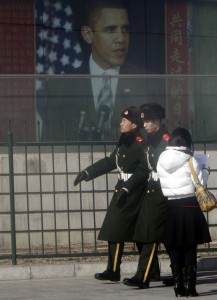Where’s the Tipping Point in U.S.-China Relations?
More on:

Some of my old State Department colleagues tell me that the current downturn in U.S.-China relations is nothing new. It’s just countercyclical, they say. “Remember the EP-3 incident? A Chinese pilot was killed and an American aircrew held prisoner.”
True enough. That was pretty bad.
“Or what about when we accidentally bombed China’s embassy in Belgrade and demonstrators trapped ambassador Jim Sasser inside the embassy while also attacking U.S. consulates?”
“Or how about when China bracketed Taiwan with missile tests in 1995 and the U.S. sailed the U.S.S. Nimitz up the Taiwan Strait in response?"
For that matter, what about Tiananmen Square?
My friends’ punch line seems to be this: If you’ve been around long enough, you’ve seen worse in U.S.-China relations. Much worse. Maybe even catastrophically worse. And by their logic, this, too, shall pass.
Maybe they have a point. But I think they’re missing three very significant changes that could make this a tipping point in the up-and-down cycles that have characterized U.S.-China relations in the past.
First, there’s China’s sheer weight in the world, which has now grown to the point that Beijing has acquired the capacity to push back at American policies as never before. China has said “no” plenty of times in the past. But what’s new is the combination of interdependence and a more weighty China. So while the administration has met some of this pushback with American counterpressure, China’s government seems lately to be probing and testing, exploring the possibilities and limits of Beijing’s strengthened capacity to say “no” to the United States.
Second, there’s the ongoing debate in China spawned by the recent financial crisis. This has been a theme at meetings I’ve held in recent months with Chinese colleagues. Some have reached sweeping (but, I think, badly exaggerated) conclusions about shifts in the balance of power, China’s "rise," and America’s "decline." But at minimum, this sort of sentiment will feed domestic pressures in China. Many, both in and out of China’s government, want to test what Beijing’s growing weight might yield. They are confident of China’s growing strength. They relish the opportunity to, at minimum, make Washington work harder for Chinese support of ostensibly shared objectives. In some cases, they want to see if Washington will accommodate a wider array of Chinese interests.
Third, the domestic politics of U.S.-China relations seem to be changing. This is true on the Chinese side: Chinese exporters, for instance, are resisting calls for exchange rate revaluation, arguing that many companies will go under and China will suffer massive job losses. But it is especially true on the American side, where the old political and business coalition may be fracturing. Some of my old colleagues, I fear, may not appreciate the degree to which the politics of China policy might get away from this president and his administration.
I’ll be watching three things:
How deep are the fissures in the coalition that sustained U.S.-China relations in the past? The American business community seems particularly conflicted. Few are pulling out of China, but, for example, a new survey from the American Chamber of Commerce in China puts the percentage of U.S. companies that feel unwelcome in the Chinese market at 38 percent, up 15 points from 23 percent just two years ago in 2008. And that sentiment extends beyond technology companies, like Google, into the manufacturing sector, with a variety of companies now complaining about a host of issues, from intellectual property theft to non-tariff barriers to various aspects of China’s regulatory regime.
How supple is the executive branch? In the toughest times, it’s been presidents of both parties, Republicans and Democrats, who have, on a bipartisan basis, put the relationship back onto an even keel. So is the administration strong enough to resist proposals that would ride the relationship completely off the rails? As my former colleague Phil Levy has written, some ideas circulating in the Washington debate go beyond the U.S.-China relationship and would weaken global institutions, including the WTO and the IMF.
Finally, in what directions are the parameters of debate shifting? China policy can’t be made in a vacuum. Indeed, China has become the centerpiece of several debates that are much bigger than U.S.-China relations per se. These include the future of American manufacturing, competiveness, and innovation; whether and how China’s rise challenges U.S. regional and global primacy; and what kinds of alliances, tie-ups, and arrangements best serve U.S. interests, including three decades of economic and commercial tie-ups with China that have included a heaping dose of technology transfer.
What certainly isn’t changing is that the United States and China are deeply interdependent. But what is changing is that a growing number of influential people on both sides find that reality deeply disquieting.
More on:
 Online Store
Online Store